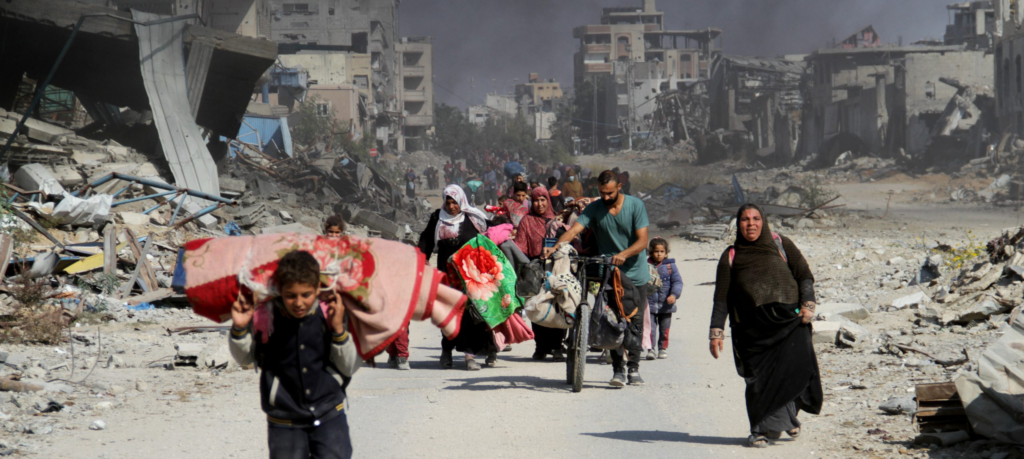| GS Paper 2 – Polity & Human Rights Legal basis of the Genocide Convention (1948) and its obligations on member states. ICJ’s use of provisional measures to uphold rights during armed conflict. GS Paper 4 – Ethics, Integrity & International Morality |
Why in News?
In January 2024, South Africa filed a case against Israel at the International Court of Justice (ICJ), accusing it of committing genocide during its military campaign in Gaza. The case has triggered global debate on the conduct of warfare, accountability, and the future of international law.
Background: The Gaza Conflict
- The conflict escalated after the October 7, 2023 Hamas-led attacks, prompting Israel to launch a large-scale military offensive in Gaza.
- Over 58,000 Palestinians have reportedly been killed, including 17,000+ children, with infrastructure such as hospitals, universities, and homes destroyed.
- As humanitarian aid dwindled, global leaders began referring to the situation as potentially “genocidal.”
What is Genocide under International Law?
The term “genocide” was coined by Raphael Lemkin in 1944, combining the Greek word genos (race or tribe) and the Latin -cide (killing). It was formally codified in the 1948 United Nations Genocide Convention following the atrocities of the Holocaust.
According to Article II of the Genocide Convention (1948), genocide is defined as:
“Acts committed with intent to destroy, in whole or in part, a national, ethnical, racial or religious group.”

Key Legal Elements of Genocide
To constitute genocide under international law, both physical acts (actus reus) and mental intent (mens rea) must be established.
1.Actus Reus: The Physical Acts
The Convention lists five specific acts that, when committed against a protected group, can constitute genocide:
- Killing members of the group
- Causing serious bodily or mental harm to members
- Deliberately inflicting living conditions calculated to bring about the group’s destruction (e.g., forced starvation, lack of medical care)
- Imposing measures to prevent births within the group
- Forcibly transferring children of the group to another group
Note: These acts must be committed against a specific group defined by nationality, ethnicity, race, or religion. Political and cultural groups are not covered.
2.Mens Rea: The Intent to Destroy
- Genocide requires “specific intent” (dolus specialis) — the deliberate aim to destroy a group, either in whole or in part.
- This is the hardest element to prove in court. Unlike crimes like murder, proving genocide requires showing that the acts were carried out with the purpose of eliminating the group — not just as a by-product of war or political conflict.
Example: If civilians die in a military operation without targeted intent against their identity group, it may not meet the legal threshold of genocide — even if mass killings occur.
Legal Instruments and Enforcement
- UN Genocide Convention (1948): Binding treaty for signatory states to prevent and punish genocide.
- Rome Statute of the International Criminal Court (ICC): Genocide is one of the four core international crimes, alongside crimes against humanity, war crimes, and aggression.
- International Criminal Tribunals: Genocide charges have been brought before courts like:
- ICTR (Rwanda Genocide, 1994)
- ICTY (Srebrenica Massacre, Bosnia 1995)
- ICJ (e.g., Bosnia v. Serbia, The Gambia v. Myanmar, South Africa v. Israel)
Why Did South Africa Take Israel to the ICJ?
The South Africa v. Israel case at the International Court of Justice (ICJ) in 2024–25 has attracted global attention. The case centers around allegations that Israel’s military operations in Gaza violate the 1948 UN Genocide Convention.
Let’s break down the legal basis, key arguments, and ICJ’s response so far:
Legal Standing: How Can South Africa File the Case?
- Under Article IX of the Genocide Convention, any state party can bring another state to the ICJ if it believes genocide is being committed.
- The Convention creates an “erga omnes” obligation — meaning it is a universal legal duty owed to the international community, not just to specific victims.
This allows states like South Africa to raise a case even if they are not directly affected.
- South Africa invoked this clause, citing a moral and legal duty to act, particularly in the face of mass civilian casualties and forced displacement in Gaza.
Claims Against Israel
Allegations by South Africa and Human Rights Groups
- Targeted destruction of civilian infrastructure (e.g., schools, mosques, hospitals).
- Starvation used as a weapon of war.
- Use of dehumanising language by Israeli officials (e.g., calling Palestinians “human animals”).
Statements Supporting Genocidal Intent
- PM Netanyahu’s vow to “reduce Gaza to rubble.”
- Other officials’ calls for “total annihilation.”
UN and Expert Reactions
- Francesca Albanese (UN Special Rapporteur) and academics like Omer Bartov and Shmuel Lederman have declared that Israel’s conduct aligns with genocidal patterns.
Israel’s Defence
- Claims actions are targeted at Hamas, not civilians.
- Civilian deaths are “collateral damage.”
- Blames Hamas for using civilians as human shields.
Criticism of Israel’s Argument
- Referred to as “humanitarian camouflage” by critics.
- Distortion of humanitarian norms like safe zones, evacuations, and protection of medical facilities.
Challenges in Proving Genocide
Legal Hurdles
- ICJ demands that genocidal intent be the only reasonable inference from actions (as per Croatia v. Serbia, 2015).
- Critics argue this bar is too high and makes genocide “nearly impossible” to prove.
Evolving Legal Opinion
- In Prosecutor v. Goran Jelisić (ICTY, 2001), it was held that personal motive doesn’t preclude genocidal intent.
- Recent international consensus is pushing for a balanced evidentiary standard.
Global Response and the Role of Powerful Nations
Muted Diplomacy
- U.S., France, Germany, and UK have avoided direct criticism, shielding Israel diplomatically.
- U.S. vetoes at UNSC have blocked ceasefire resolutions repeatedly.
UN Actions
- UNGA passed a resolution calling for economic sanctions and an arms embargo on Israel.
- Proposal to suspend Israel from UNGA under Article 6 due to Charter violations.
Implications for International Law
Credibility Crisis
- The ICJ case is now viewed as a litmus test for the international rules-based order.
- If Israel continues non-compliance, it may set a dangerous precedent for other global conflicts.
Future of Genocide Law
- May catalyse reforms in proving genocidal intent.
- Could redefine state responsibility and accountability under humanitarian law.
Case Studies
Myanmar (2019)
- Gambia vs. Myanmar on Rohingya genocide. Precedent for South Africa’s case.
- ICJ accepted Gambia’s standing as a third party.
Rwanda Genocide (1994)
- Tribunal held that systematic targeting based on group identity is core to genocide.
Israel–Gaza 2024
- Unique case where a democratic state is accused of genocide, shifting global legal debates.
Way Forward
- Immediate ceasefire and humanitarian access must be ensured.
- Strengthen the ICJ’s enforcement mechanisms to deal with state non-compliance.
- Encourage UN reforms to curtail misuse of veto power in humanitarian crises.
- Promote global legal education and advocacy to prevent misuse of international law.
Conclusion: A Landmark Legal and Moral Challenge
South Africa’s ICJ case against Israel represents a landmark legal effort to hold states accountable under the Genocide Convention, irrespective of military or political power. While a final verdict may take years, the ICJ’s acknowledgment of a “plausible risk of genocide” is already shaping global discourse on war ethics, accountability, and international law.
| Mains Practice Question: Q. Discuss the significance of the South Africa v. Israel case before the International Court of Justice (ICJ) in the context of international law and global accountability. What implications does it hold for the enforcement of the Genocide Convention and the evolving role of the Global South in multilateral diplomacy? (250 words) |
SOURCE- THE HINDU
Found this helpful?
Bookmark for revision, Practice the mains question, and
Share with fellow aspirants! THANK YOU
